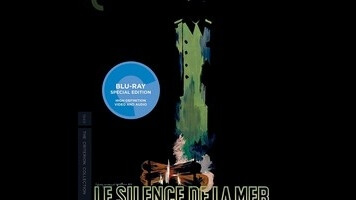Jean-Pierre Melville hit the ground running with a moving debut, Le Silence De La Mer

For its first several minutes, Le Silence De La Mer (the title translates as The Silence Of The Sea) seems woefully ignorant of the dictum that a motion picture should show rather than tell. Not only is there near-constant voiceover narration, but the first-person narrator often describes actions taking place onscreen at that very moment. “The next morning, a military touring car entered the garden,” he intones over a shot of a military touring car entering the garden. As a couple of soldiers lift crates out of the car, the narrator helpfully adds, “Two soldiers withdrew two crates from it.” Since Le Silence De La Mer was its writer-director’s debut feature, viewers could reasonably conclude ignorance, if not outright ineptitude. However, that writer-director was the great Jean-Pierre Melville—who’d go on to make such classics as Bob Le Flambeur, Le Samouraï, and Army Of Shadows—and he knew exactly what he was doing.
Made in 1947 and released two years later, Le Silence was adapted from a pseudonymous novella, published in 1942, that became a rallying cry for the French Resistance (of which Melville had been an active member). It’s set during the Occupation, and concerns an unnamed elderly man (Jean-Marie Robain), called “the uncle” in the credits, and his young, equally nameless niece (Nicole Stéphane), who live together in a small country house. One day, a German officer, Werner Von Ebrennac (Howard Vernon), shows up and announces, rather apologetically, that he’s to be billeted with them. The uncle and the niece accept this, as they must, but they rebel by refusing to speak to Von Ebrennac, or even to acknowledge his presence most of the time. Von Ebrennac, by contrast, yearns for their company—he’s a serious Francophile, among other things—and spends almost every evening pretending to warm himself by the fire so that he can talk to them, even though the “conversation” is entirely one-sided. Over time, he even falls in love with the niece, despite never having received so much as a curious glance from her.
Once it becomes clear that the uncle and the niece are going to remain (almost) entirely silent for the duration of the movie, Melville’s unconventional use of voiceover narration makes a lot more sense. Von Ebrennac’s self-conscious torrent of verbiage needs to be balanced by the uncle’s interior monologue, and that monologue needs to be as matter-of-fact as Von Ebrennac’s lengthy speeches are abstract and idealistic. Melville cagily cast the severe-looking Vernon (who’d later star in numerous Jess Franco movies, including The Awful Dr. Orlof) as an unusually sensitive Nazi who believes, with heartbreaking naïveté, that Germany and France will soon unite to form one great European nation, and is horrified to learn what his superiors actually have in mind. Meanwhile, the narration reveals the uncle’s growing respect and admiration for his unwanted guest, even as the old man steadfastly keeps his mouth shut. So rigid is the dynamic in the parlor that the four mundane words finally spoken to Von Ebrennac are a seismic event.
Sticking closely to the text of the source novella (written by Jean Bruller, who published it under the name Vercors), Melville finds numerous innovative ways to shoot one man walking around a room talking to two seated people who never respond, at one point even appearing to place the camera inside the fireplace while the fire is blazing. His efforts to open up the picture, via flashbacks and a trip Von Ebrennac takes to Paris, are less successful, in part because he was working with a short schedule and a tiny budget. There are some minor distractions, too: the theatrical old-age makeup worn by Robain, who was only 34; the shoddy dubbing of all of Vernon’s lines, even though he’s clearly speaking French; the anachronistic reference to the Treblinka death camp, which hadn’t yet been constructed at the time the movie is set. That last one is eminently forgivable, though—Melville was Jewish (his real surname was Grumbach), and not mentioning the Holocaust would surely have felt irresponsible to him, especially in 1947. An opening crawl even insists that Le Silence De La Mer “has no pretension of solving the problem of Franco-German relations, for they cannot be solved while the barbarous Nazi crimes, committed with the complicity of the German people, remain fresh in men’s minds.” Harsh words, but the empathy that permeates this remarkable film barely reflects them at all.
Le Silence De La Mer is available on Blu-ray and DVD from Criterion. It’s also currently streaming on Hulu Plus.